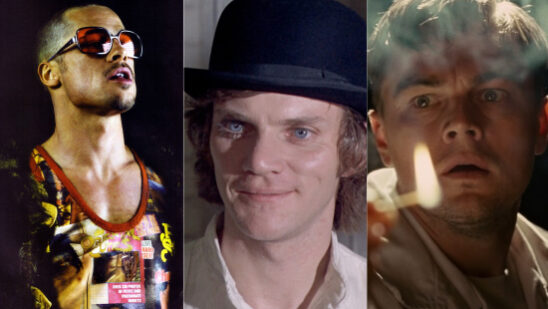
It could be anything. An ambiguous cue, a last-minute shot, or an unanswered question. It has happened that people grossly misinterpret some films. The conclusions drawn are usually on point but in some cases, it can be off by a long shot. That’s right, we’re looking at film endings that are often misinterpreted and/or misunderstood by general moviegoers. There is a certain severity of the gap between the perceived meaning of the ending and the actual intended outcome. People have no idea how simple the endings are to understand. So here are the 15 movie endings that don’t mean what you think:
15. Vanilla Sky (2001)
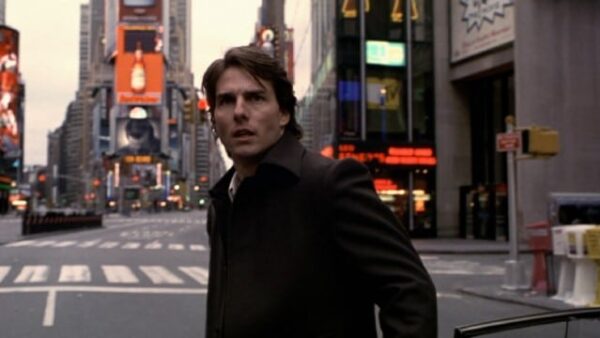
Vanilla Sky’s plot revolves around the character portrayed by Tom Cruise whose life gets filled with troubles after a life-threatening encounter. It is later revealed that Cruise had been in a lucid dream for over 100 years with his brain in cryonic stasis.
Due to a glitch in the system holding him, disturbing events start occurring in his brain. He is given a choice to either die in the dream by jumping from a building (which would eventually wake him up) or restart the dream all over again. Cruise chooses the former and he is brought back to life.
The film’s ending is open to interpretation. However, it is easier to endorse that the events that took place in the movie were real. The team behind the movie didn’t care to explain too much either.
14. Birdman (2014)
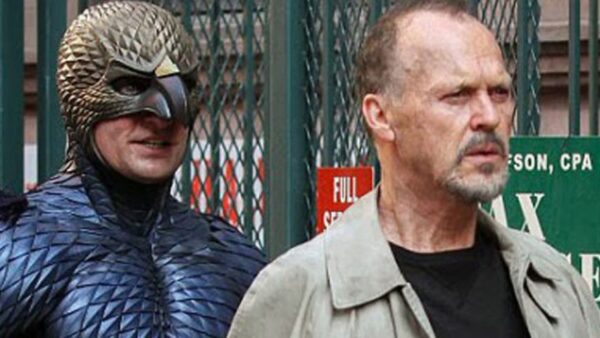
The film follows the journey of Riggan Thomson, who plans to rekindle his career through a Broadway production. During his prime, he played a superhero with bird characteristics.
The portrayal of such a character with time, however, makes him believe that he is the Birdman and possesses the powers that his character did. In the end, when his daughter Sam comes to check on him in the hospital and finds the bed empty and the window open, she first looks down the window but then gradually starts looking at the sky and smiles.
Many viewers believe that the reason she looks up is that Riggan possesses the powers of the Birdman. However, that is not the case. What happens is that Sam, like Riggan, chooses to live in denial and believes that her father has flown away. Thus, the ending is all about the strong bond shared by the father-daughter duo and not about whether Riggan flew away or committed suicide.
13. Primer (2004)
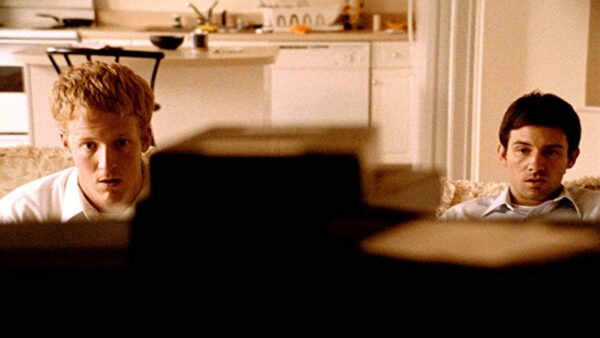
Image Source: imdb.com
Often regarded as one of the most difficult-to-understand science fiction films of all time, Primer follows the journey of Abe and Aaron, who unintentionally create a time machine. That’s the simple part, however. Throughout the film, different timelines with body doubles of the lead characters are explored, leaving the viewers as confused as Abe and Aaron.
The ending sequence shows a double of Aaron being accompanied by a double of Abe to the airport, with the latter claiming to protect the former’s family from a certain someone. Another double of Aaron also issues a hidden warning to an additional double of Aaron. The overly complicated ending should not be looked too deep into, however, as the underlying message behind it is the catastrophic effects of building something whose dangers are unknown and whether such a thing should be created or not.
12. The Wrestler (2008)

For the most part, The Wrestler seemed like a generic sports drama about an athlete out of their prime preparing to make a big comeback to what they love the most. However, that is until the end when the audience is left hanging. A quick recap for those who haven’t watched this movie or have gotten out of touch with it, the flick revolves around the character of Robin Ramzinski (portrayed by Mickey Rourke), a former famous Wrestler, attempting to deal with his failures by making his return to the wrestling ring.
In the end, however, unlike conventional sports movies, it isn’t told whether he wins his match or not as he just leaps out of the frame and that is the end. The meaning behind it is that Ramzinski was aware of the dangers of performing such a different move, considering his bad health.
Still, he decided to go with it as he felt alive when he was in the ring entertaining the audience, and believed that the audience would determine when his time was up. Long story short, it didn’t matter whether he successfully executed the move or died trying. What mattered was that he got to do what he loved the most, one more time.
11. Videodrome (1983)
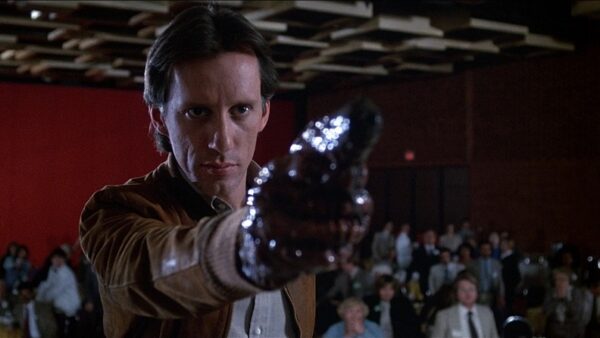
This 1983 body horror film undoubtedly challenged its audience’s intelligence with the help of a complex plot focusing on the president of a Toronto TV station, who went by the name Max Renn. His pursuit of edgy content for his network leads him to a mysterious broadcast that results in a series of mind-boggling twists and turns transpiring during the rest of the movie including body modification.
The film ends with Max pointing his hand (which has transformed into a flesh gun by then) at his head and supposedly killing himself off by saying,
“Long live the new flesh”.
However, Max doesn’t kill himself as he has become the new flesh via the film being watched by the audience, rendering him unable to die.
10. Rocky (1976)
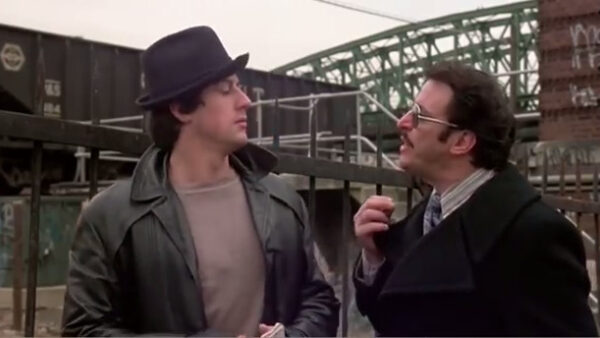
Image Source: imdb.com
Rocky is a boxing movie that’s not about boxing. The famous training montage and climactic fight are a lot of fun and the movie was always more interested in telling a wholesome story. It was about an underachiever discovering his potential. The film tells us that the result of the fight is inconsequential.
Many viewers booed Rocky’s (played by Sylvester Stallone) loss to Apollo and others criticized the movie’s lack of focus regarding the outcome. However, they fail to understand that the lack of focus is entirely the point of the movie. Rocky went the distance and found love along the way proving his self-worth and when you accomplish that, who cares what the judges have to say?
9. Taxi driver (1976)
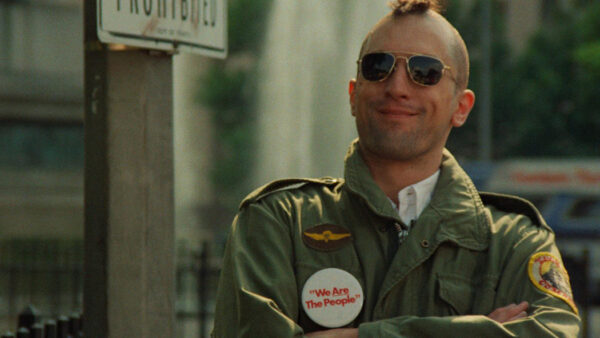
The ending of Taxi Driver has been discussed and debated for decades. Some people believe that Travis died in the brothel and that the final scene with Betsy is some kind of death dream. On the other hand, others believe that the Betsy scene happened, which we believe it did.
However, there is even further debate as some interpret the ending as Travis being cured and returning to normality. That, on the other hand, couldn’t be further from the truth. By having Travis do a double-take in the rearview mirror, the movie is subtly showing us that Travis has found something else. This is a secure hint that he’s still dangerous and that he will indefinitely continue his cycle of violence.
8. Shutter Island (2010)
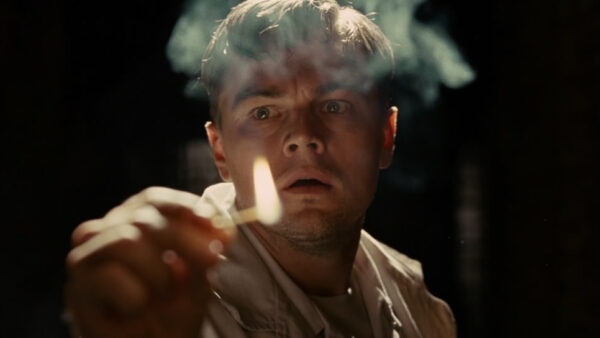
When Andrew questions the Psychiatrist about slipping him drugs for the past two years in Boston, it seems the climax of the movie has finally come to light. However, near the end of Shutter Island, we discover that Teddy Daniels (played by Leonardo DiCaprio) is Andrew Laeddis.
He is a patient at the mental hospital, who murdered his wife. Initially, Laeddis shows signs of understanding his true identity and the doctors also declare that this has happened before. They also mention that Laeddis had unfortunately regressed. We even see him confessing,
“My name is Andrew Laeddis and I murdered my wife in the spring ’52.”
This is seemingly proven when he refers to Sheehan as Chuck. Understandably, some people interpret the ending as Laeddis simply regressing into his role as Teddy again. However, in his last moments, Teddy gives a hint to his doctor that perhaps he is aware of his dangerous nature and sacrificing himself. This means that Laeddis is only pretending to be Teddy to get a lobotomy and end his suffering which is evident by his question to Sheehan, his refusal to answer Teddy, and Sheehan’s bewildered response. He even asks,
“Which would be worse, to live as a monster or die as a good man?”
Furthermore, James Gilligan, the film’s psychiatric adviser gave us a definitive answer; Teddy has indeed been cured, but can’t deal with his violent past. Gilligan felt the film should draw focus on the number of lobotomies conducted in the fifties and thus didn’t have the same desire to keep quiet as the rest of the film’s crew.
7. Get Out (2017)
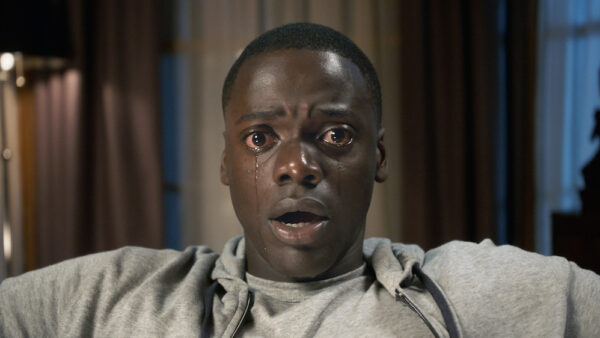
Get Out seems to have a pretty happy ending. As we see Rod arrives and rescues Chris. We also see that the Armitage family is dead. However, things aren’t as happy as they seem and it is evident by Chris’s dejected stare. Let’s go over this, so Chris is aware that there are far more members of the Armitage family still out there.
Who even knows how many kidnapped black people are still wandering around as his host? The ending could also be an ironic statement on our modern culture and the current racist state of things. It is most certainly not handled contrary to what Rob thinks and it looks as if Chris knows that Armitage Azar is still out there both literally and figuratively.
6. Whiplash (2014)
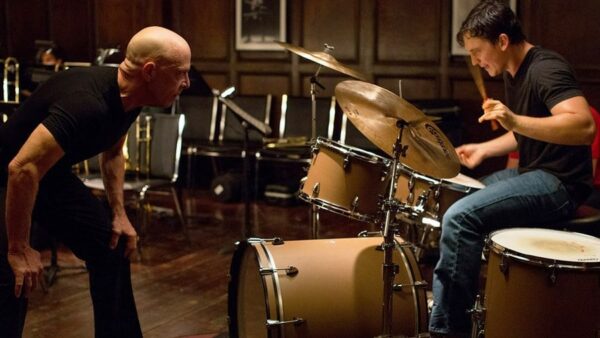
As his instructor tells him,
“ There are no two words in the English language more harmful than Good Job.”
Whiplash tells the story of an ambitious jazz student and his abusive instructor. The story serves as a great fable about the quest for perfection. However, to most viewers the ending seems relatively happy we must take a closer look at Andrew and his relationship with Fletcher.
We see by the end of the film Andrew is completely ruined and has sacrificed his entire life for drumming. On top of that, the ending seems to hint that Andrew wants Fletcher’s approval more than he wants to be a successful drummer. This unhealthy quest for perfection and approval will only lead to more loneliness and tension. Who knows Andrew could even wind up suicidal like Sean Casey? As we see him say,
“I’d rather die drunk and broke at 34 and have people at a dinner table talk about me than live to be rich and sober at 90 and nobody remember who I was.”
5. In Bruges (2008)
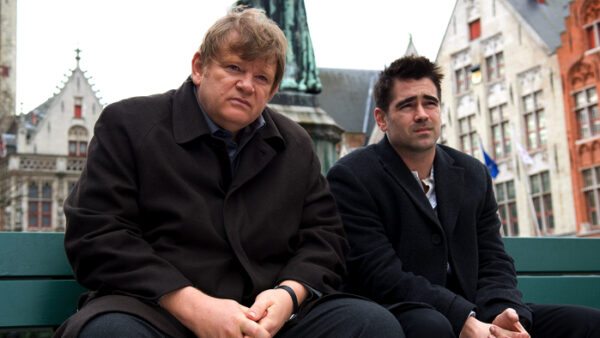
Leaving a character’s fate unanswered is often a cheap storytelling tactic used for unearned discussion or sequel bate. While In Bruges does employ this tactic, the often frustrating ambiguous death trope it uses is to make a complex and thematic effect throughout the film. Colin Farrell‘s character Ray is suicidal after accidentally killing a child. During the climax, we witness that Ray is shot by his employer Harry, and taken into an ambulance.
We witness Ray’s narration about his wish to stay alive and we never learn the outcome. The actual catharsis here comes from Ray wishing for life as Ken suggested. Ray had earned his Redemption and atoned for his sins and that’s good enough for us. However, we cut to the credits before we can get enough proof for either argument. Turns out, you don’t have to go too far from the source to find an answer. The shooting script had an extra scene after what is now the film’s end. The scene has the camera zooming out from a newspaper clipping on the shootout.
We see Ray alive but far from well back home in London. Not just removing ambiguity, the scene adds an extra layer of bleakness to the film; Harry’s bullet didn’t kill Ray but in the last moments of the story he kills himself. The extra scene isn’t overall required for the plot (aside from giving closure to the Ray-Chloe relationship) and you can see why McDonagh went with the less definite solution.
4. Total Recall (1990)
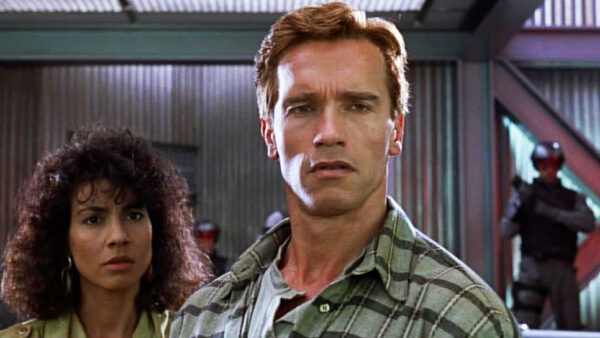
Image Source: imdb.com
The ambiguity of Total Recall’s ending has made it one of the most debated endings in Science Fiction Cinema. The ending sees the reactor releasing air into the Martian atmosphere and turning the sky blue. Everything seems well, unhappy but there’s a reason why Quaid (played by Arnold Schwarzenegger) thinks about the possibility of it being a dream. As we see earlier in the movie, a lab tech mentions a blue sky on Mars and there are various other hints littered throughout pointing to the ending being a fabrication.
Yet people still wonder if the ending happened or if was it all a programmed dream. The answer is: that Quaid was still dreaming, as simple as that is. The moment the camera cuts away from the start of the Rekall procedure, everything that follows is our visual impression of Quaid’s dream.
Many of the movie’s plot elements are culled directly from innocuous moments embedded in those few opening scenes. The Rekall scientists even explicitly mention that they combine the base program with elements from the subject’s real life to better create real memories. Therefore, the whole trip is just a bunch of stimuli and nothing else.
3. Fight Club (1999)
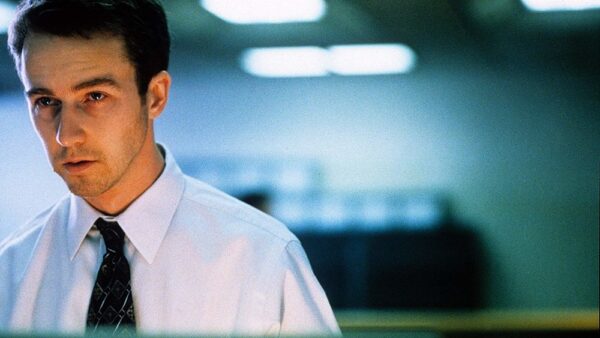
Fight Club is one of the most celebrated movies of all time as posters of Tyler Durden (played by Brad Pitt) have littered many college dorms. Additionally, Durden’s philosophies are often hailed as some sort of cure for the modern commercial age. However, Fight Club is also arguably one of the most misunderstood movies of all time. The catch is we’re not supposed to root for Durden.
The ending in which the buildings explode is not meant to be cheered or viewed as some sort of moral victory against the powerful elite but an ominous sign of misaimed frustration. Technically, we’re not supposed to cheer for the explosions because they serve as a critique of the narrator’s unhinged mental state. As the narrator explains this violence is a result of a very strange time in his life.
2. Inception (2010)
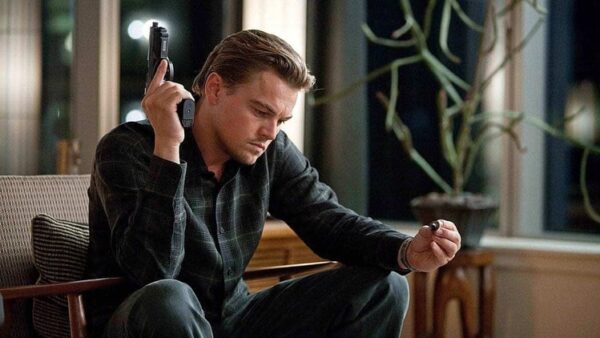
Inception, like many other Hollywood masterpieces, utilizes the otherwise frustrating lack of closure for thematic importance. The ending sees Cobb returning home to his children and ignoring the totem. The viewers see the camera linger on the spinning top, leaving whether Cobb was dreaming or not up to debate. However, nobody seemed to understand that the idea of Cobb being in a dreamer reality is not the point. When Cobb says this,
“I need to get home that’s all I care about right now. I can’t you go home because they think I killed her”,
his anxiety and fear are evident. Thus, the point is that Cobb chooses his reality by ignoring the totem. It doesn’t matter if the children are real or not. What matters is that Cobb has finally found peace and acceptance.
1. A Clockwork Orange (1971)
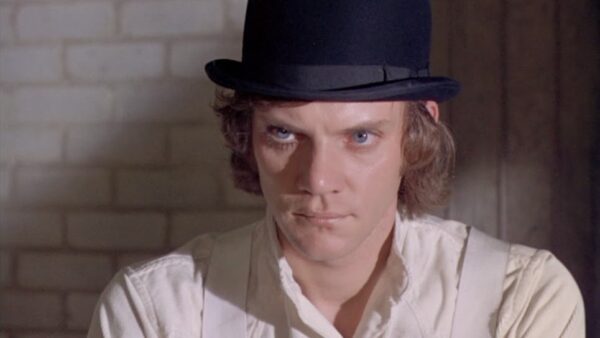
The ending of Clockwork Orange remains controversial and misunderstood to this day. It could be perhaps due to the dislike for inherent evil the ending sees. Alex (played by Malcolm Mcdowell) shedding his tendencies towards violence and sex, being offered a job by the minister, and declaring that he’s cured came as a shocker to many.
The confounded viewers were left to assume the permanence and continuity of his law-abiding nature. What nobody quite catches is that this final declaration from Alex is laden with sarcasm he’s most certainly not cured and will revert to his violent ways. Sure, Alex eventually matures in the novel but this is not the case in the film. The film seems to be suggesting that evil cannot be controlled.
Hope you enjoyed reading our list of movie endings that don’t mean what you think. Feel free to share your views in the comments below!